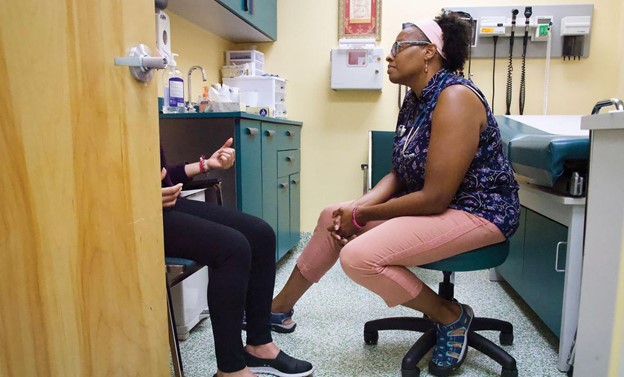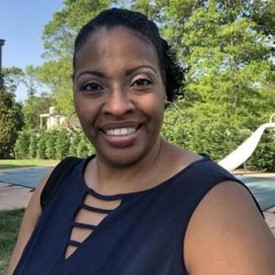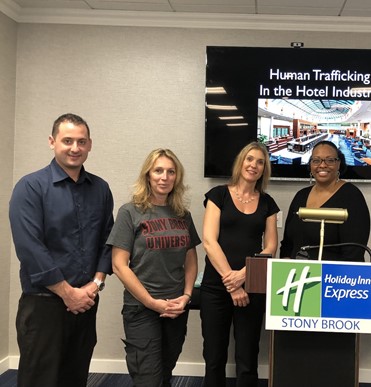PA Dedicated to Helping Survivors of Sexual Assault and Human Trafficking
Shantae Rodriguez, PA-C, Says PAs Need to Educate Themselves
August 20, 2022
By Kate Maloney

In 2010, Shantae Rodriguez, PA-C, was working her normal shift in the emergency department (ED) when she noticed a palpable shift in the energy of her co-workers. A patient came in, and, it seemed to Rodriguez, no one wanted to take the patient’s chart. Rodriguez didn’t know exactly what was going on at the time, but her interest was piqued. She wanted to see the patient and consulted with her attending physician. The attending physician told her no; there was someone coming in the see the patient. Rodriguez found out later that the patient was a victim of sexual assault and the healthcare provider who eventually saw the patient was a Sexual Assault Forensic Nurse (SANE). After some investigation, Rodriguez learned that PAs can be trained as Sexual Assault Forensic Examiners (SAFE) in New York state. She wanted to be able to provide care to a future patient in a similar situation, and immediately decided to train as a SAFE.
[Daily alerts with relevant clinical news – included with membership]

Becoming a PA
When Rodriguez was growing up, she wanted to be a pediatrician. “I was the little girl who would go with her grandmother to the doctor and wanted to learn how to take blood pressure,” she recalls. “I’ve always been interested in the body and science.” Her path didn’t lead her to medical school, however, it led her to PA school. “I was 28 when I decided to go to PA school,” she says. “The flexibility of the PA profession really worked for my life.” Before and during PA school, Rodriguez worked as an EMT. “It opened up the world of emergency medicine to me,” she says. She has been working – either full-time or part-time – in emergency medicine since.
Sexual Assault Forensic Examiner
After Rodriguez’s experience with a sexual assault victim in the ED, she started researching the role she’d heard about – Sexual Assault Forensic Examiner (SAFE). Determined to be able to help victims of sexual assault, she began the three-month training as soon as she could. The training has both didactic and clinical portions, and separate courses for adult and adolescent patients. SANE/ SAFEs conduct patient interviews, evidence collection, forensic exams, and may be called upon to testify in future court appearances.
Rodriguez’s work as a SAFE is in addition to her clinical work in the emergency department. SAFE staffing varies from county to county and state to state so Rodriguez has served as a SAFE in both an on-call capacity, as a hospital employee, and as an independent contractor. “We work on a multi-disciplinary forensic team,” she explains. “Our goal is to get a SANE/SAFE in to see a patient within one hour of presenting to the ED.”
[Get involved with the Fellowship of Christian PAs]
Human Trafficking
Rodriguez’s passion for helping victims of sexual assault and human trafficking extends beyond her work in New York. Since 2011, she has been making annual trips to Nicaragua to provide medical care to victims of human trafficking. “I’d always wanted to go on medical mission trips,” she says. “It was something I looked forward to about being a PA. I wanted to get out in the world and help as a healthcare provider.”
In 2011, Rodriguez had yet to hear the term “human trafficking.” She was exposed to it first-hand in Nicaragua. “I saw woman and children,” she recalls. “Our purpose was to let the patients know that we were here and wanted to make sure they were healthy, and connect them with the local anti-trafficking organization.” Rodriguez’s group saw over 1,000 patients during the week they were there; they provided primary and gynecological care. “It was a life-changing experience,” Rodriguez says. “I’m thankful that I can give back in this way. It’s such an overwhelming topic, and people tend to shy away from it. But once it touches you, you can never turn back.”
She currently combines her SAFE training, anti-trafficking experience, and her PA career as director of a women’s health for survivors of human trafficking in Queens, New York.
[Human Trafficking: Become Informed and Be Attentive]

PAs need to educate themselves and get involved
Rodriguez is clearly a dedicated advocate for victims and survivors of sexual assault and human trafficking. Since her first experience with a victim of sexual assault years ago, she has devoted her career to helping these patients. She implores her PA colleagues to get more involved. “Some healthcare providers may think human trafficking is a law-enforcement issue,” she says. “They don’t understand how much healthcare is involved and what we are really capable of doing. We are capable of helping. This is a public health issue.”
“If you don’t know what you’re looking for, you won’t see it,” Rodriguez says. “PAs must educate themselves. You have most likely interacted with a victim or a survivor of trafficking. We know that from listening to survivors, through retrospective studies of their time in trafficking, who report being taken to the dentist, or a gynecologist, or a primary care office, and to emergency departments. If we as providers aren’t educated on what to look for, you’re not going to look for it.”
Rodriguez thinks PAs are uniquely positioned to help victims of sexual assault and human trafficking. “As PAs, we often get those few extra minutes to sit and talk with a patient. If we are primed to look for the signs and indicators, we can help. When I sit with any patient, my goal is to let this person know that I’m here to help them holistically. I think as healthcare providers, sometimes we think that if we can’t ‘save’ the person, we’re not doing our job. But our job is to see our patients, listen to them, and let them know that we are here for them through a trauma-informed approach. Every conversation can help. Once a relationship is established, we can get deeper into: ‘How can I help you move forward? How can I empower you? What resources do you need from me?’ But first we need to be willing to start some of the tough conversations, ask the hard questions: ‘Are you safe? Is someone threatening or hurting you? Are you being forced to do things against your will for exchange of money, shelter, food, or clothing?’ Along those lines, it’s very important to understand the goal is not for disclosure but rather to create a safe and trusted environment for the patient.”
Whatever the patient may say, Rodriguez will do her best to assist. She hopes other PAs will join her by first, educating themselves, and then getting directly involved. “There is no lack of need and we can advocate for those who cannot always advocate for themselves.”
[Working with Survivors of Sexual Violence Presents Unique Challenges]
Rodriguez’s Recommended Resources
Rodriguez recommends researching your local area’s anti-trafficking, domestic violence, or sexual assault organizations, and the national and global programs listed below.
Alliance For Hope International and the Family Justice Center Alliance
CMDA
ECPAT International
Futures Without Violence
HEAL Trafficking
International Justice Mission
National Human Trafficking Training and Technical Assistance Center
Polaris Project
RAINN
SOAR to Health and Wellness Training
Shantae Rodriguez, PA-C, practices emergency medicine in Long Island, New York; she is a Suffolk County, New York SAFE; director of women’s health for New Life Community Health Center for survivors of human trafficking in Queens, New York; and serves on the boards of Long Island Against Trafficking and House of Hope Nicaragua.
Kate Maloney is AAPA’s senior manager, communications. She can be reached at [email protected].
Editor’s note: This article originally appeared in November 2020.
You May Also Like
Fellowship of Christian PAs
Human Trafficking: Become Informed and Be Attentive
Working with Survivors of Sexual Violence Presents Unique Challenges
Thank you for reading AAPA’s News Central
You have 2 articles left this month. Create a free account to read more stories, or become a member for more access to exclusive benefits! Already have an account? Log in.



